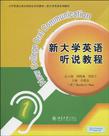新大学英语听说教程1
当前位置:首页 > 教材 > 研究生/本专科 > 新大学英语听说教程1
出版社:北京大学出版社
出版日期:2010-4
ISBN:9787301170854
页数:142页
作者简介
《新大学英语听说教程1(英文版)》由北大外国语学院副院长刘树森教授、清华大学英语系副主任刘世生教授联合总主编,对原版引进的听说教材进行针对国内“三本”院校的本土化改编。本教材是典型的贯彻了“任务依托式”教学理念的大学英语教材,在美国主要针对社区大学中母语为非英语国家的移民学生,符号高教司关于大学英语教学改革及4、6级考试改革中重视听说的精神。
书籍目录
CHAPTER 1 The Power of Music / 1 ACADEMIC FOCUS: HUMANITIES - MUSIC CHAPTER 2 Nutrition and Human Health / 19 ACADEMIC FOCUS: SCIENCE - NUTRITION CHAPTER 3 Themes of Geography / 40 ACADEMIC FOCUS: SOCIAL SCIENCE - GEOGRAPHY CHAPTER 4 Are You Getting the Sleep You Need? / 126 ACADEMIC FOCUS: SCIENCE - HUMAN BIOLOGY AND PSYCHOLOGY CHAPTER 5 Laughter Is the Best Medicine / 87 ACADEMIC FOCUS: SCIENCE AND SOCIAL SCIENCE - PSYCHOLOGY, SOCIOLOGY, AND MEDICINE CHAPTER 6 Google: A Business Dream Come True / 115 ACADEMIC FOCUS: GENERAL BUSINESS - BUSINESS AND TECHNOLOGY Appendices
前言
历史跨人21世纪之后,伴随着中华民族的发展和崛起,更好地培养具有高水平的英语应用能力的新世纪人才便成为我国大学英语教学所肩负的重要任务,也是时代所赋予的使命。如果说,在人类开始步入现代社会的19世纪,马克思说“外国语是人生奋斗的一种武器”,歌德说“只通晓一种语言的人无法真正理解他的母语”。主要是着眼于掌握和使用一门外语对作为个体的人的作用和意义.那么在当今社会各个领域都日益全球化、多元的民族文化融合交织的复杂背景下。无论是个人还是国家和民族,掌握并运用一门作为国际通用语言的外语,对其存在与发展的重要性都是不言而喻的。 在教育领域,教材历来是教学的重要基础,教材的质量与特征也在很大程度上决定教学效果。就大学英语教学而言,教材的不断更新和建设历来是促进教学改革、提高教学质量的重要基础和先行任务。在国家的宏观政策方面,国家教育部和全国高校外语教学指导委员会长期以来一直坚定推行大学英语教学改革,制定并颁布了新时期的《大学英语课程教学要求》,为大学英语教材的编写及其教学工作提供了指导与依据。在上述背景下,北京大学教材建设委员会重点立项“大学英语”教材建设,北京大学出版社具体组织、策划了本套《大学英语立体化网络化系列教材》的编写和出版工作,并被教育部批准为普通高等教育“十一五”国家级规划教材。 作为《大学英语立体化网络化系列教材》的重要组成部分,《新大学英语系列教材》原由美国最大的教育出版社之一Houghton Mifflin出版社刊行,其主要特色是:基于目前全球化的教育背景,在教材内容中注重培养国际化视野,传授综合性的学术知识,循序渐进地提高英语基础和应用能力。2009年,北京大学出版社将该教材引入国内后,我们根据国家教育部和全国高校外语教学指导委员会制定的《大学英语课程教学要求》,结合当前国内高校英语教学的普遍现状,对原教材进行了全面修订,酌情删节和补充,旨在保留其主要内容与特征的基础上,充分体现我国大学英语教学的宗旨和特色。
章节摘录
2. Eating Better Than OrganicBy JOHN CLOUD A selection of fresh vegetables from the Windflower Farm in upstate New York, near theVermont border. Not long ago I had an apple problem. Wavering in the produce section of a Manhattangrocery store, I was unable to decide between an organic apple and a nonorganic apple (whichwas labeled conventional, since that sounds better than "sprayed with pesticides that might killyou"). It shouldn't have been a tough choice——who wants to eat pesticide residue?——but theorganic apples had been grown in California. The conventional ones were from right here inNew York State. I know I've been listening to too much npr because I started wondering:How much Middle Eastern off did it take to get that California apple to me? Which farmershould I support——the one who rejected pesticides in California or the one who was, in someromantic sense, a neighbor? Most important, didn't the apple's taste suffer after the fruit wascrated and refrigerated and jostled for thousands of miles? In the end I bought both apples. (They were both good, although the California one hada mealy bit, possibly from its journey.) It's only recently that I had noticed more locally grownproducts in the supermarket, but when I got home I discovered that the organic-vs.-localdebate has become one of the liveliest in the food world. Last year Wal-Mart began offeringmore organic products——those grown without pesticides, antibiotics, irradiation and so on——andthe big company's expansion into a once alternative food culture has been a source of deepconcern, and predictable backlash, among early organic adopters. Nearly a quarter of American shoppers now buy organic products once a week, up from17% in 2000. But for food purists, "local" is the new "organic," the new ideal that promiseshealthier bodies and a healthier planet. Many chefs, food writers and politically minded eatersare outraged that "Big Organic" firms now use the same industrial-size farming andlong-distance-shipping methods as conventional agribusiness. "Should I assume that I have aGod-given right to access the entire earth's bounty, however far away some of its produce isgrown?" asks ethnobotanist Gary Paul Nabhan in his 2002 memoir, Coming Home to Eat:The Pleasures and Politics of Local Foods. Nabhan predicted my apple problem when hevacillated over some organic pumpkin canned hundreds of miles from his Arizona home. "Ifyou send it halfway around the world before it is eaten," he mused, "an organic food stillmay be 'good' for the consumer, but is it 'good' for the food system?" ……
图书封面
